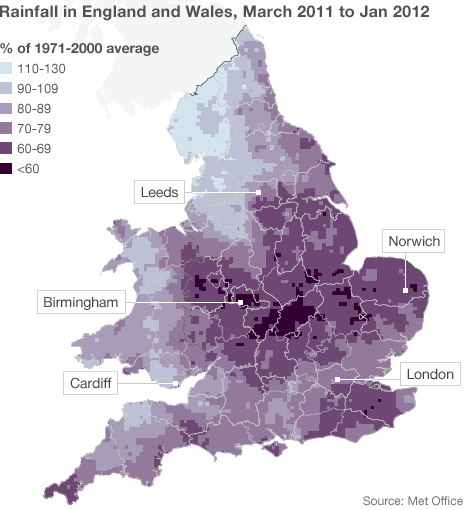South East latest part of England officially in drought
- Published
- comments
Aerial footage of shrinking reservoirs
Much of southern and eastern England is officially in a state of drought, the Department for Environment, Food and Rural Affairs (Defra) has announced.
The announcement came as Environment Secretary Caroline Spelman hosted a drought summit.
In parts of south-east England groundwater levels are lower than in the infamously dry summer of 1976.
Water companies are ready to bring in hosepipe bans from early spring, where necessary, Defra says.
The firms have agreed measures to reduce the environmental impact of dry conditions, including reducing water losses and improving leak detection, as well as encouraging customers to save water.
The Environment Agency will also take steps such as monitoring the impact of the dry weather on fisheries and wildlife.
Ms Spelman said after the summit: "Drought is already an issue this year with the South East, Anglia and other parts of the UK now officially in drought, and more areas are likely to be affected as we continue to experience a prolonged period of very low rainfall.
'Use less'
"It is not just the responsibility of government, water companies and businesses to act against drought.
"We are asking for the help of everyone by urging them to use less water and to start now."
Mary Creagh, Labour's shadow environment secretary, described the drought summit as being "more talk and no action".
"The Tory-led government is out of touch with the pressures facing families - the fact that it has postponed its long-awaited Water Bill means that there will be no action to tackle unsustainable water usage or to help households facing rising water bills for at least another two years," she said.
Water companies, farmers and wildlife groups were invited to discuss the situation at the summit.
Thames Water's sustainability director Richard Aylard said: "There is a high chance we will need restrictions at some stage this summer unless either we get a lot of rain or fantastic co-operation from customers using less water."
He urged people to turn off taps while cleaning their teeth, take shorter showers, fix leaks and only wash laundry with a full load.
The South East joins parts of eastern England which have been in a drought situation since last summer.
That contrasts markedly with Scotland, where reservoirs are between 93% and 97% full.
Ms Spelman said she wanted water companies to look at the possibility of connecting pipe networks so they could transfer water from wetter areas.
Severn Trent's water director, Andy Smith, said each water company had tended to focus on its own area.
"We should be looking at interconnecting the networks between the various water companies.
Low river levels
"There will be opportunities with relatively small levels of investment to make inter-connections between different organisations to try and get the water from the north and the west where it's relatively wet down to the south and the east."
The lack of rain, over the course of two dry winters, appeared to be continuing last month.
South-east England received just two-thirds of the long-term average rainfall for January.
Rainfall has been below average for 18 of the last 23 months in the Thames Valley region and London.
Flows in the River Lee, which passes through Hertfordshire and parts of north-east London, are at less than a quarter of the long-term average for the waterway.
And the Kennet, in Wiltshire, has seen flows of just 31% of its average levels.
The river has dried up completely to the west of Marlborough.
Meanwhile, the Darent, in Kent, is at extremely low levels, as is the Wye in Surrey.


- Published20 February 2012
- Published17 February 2012